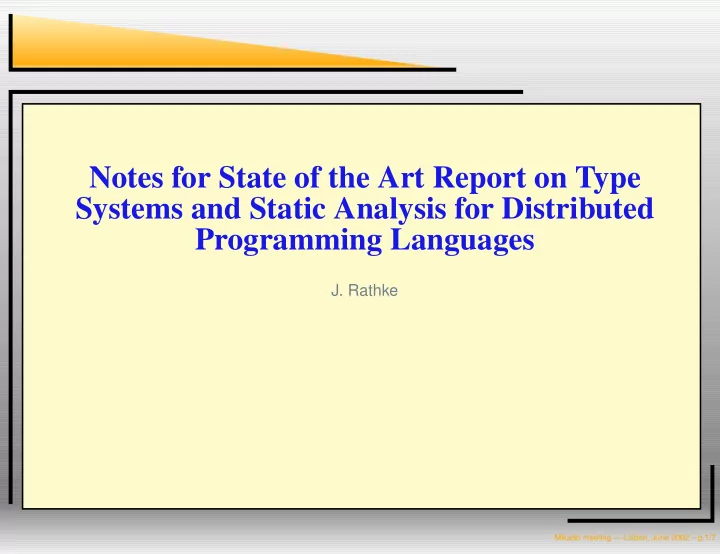

Notes for State of the Art Report on Type Systems and Static Analysis for Distributed Programming Languages J. Rathke Mikado meeting — Lisbon, June 2002 – p.1/7
Introduction • Why use typed languages? • What is typed static analysis? • What are the advantages of typed vs non-typed static analysis? • What are (dependent) type and effect systems? • What are the benefits to distributed programming languages? Mikado meeting — Lisbon, June 2002 – p.2/7
Memory Management and Regions • Region-based memory management. (Tofte, Talpin) • Type and effect systems. (Nielsen, Nielsen) Mikado meeting — Lisbon, June 2002 – p.3/7
Resource Access Control and Secure Code • From system F to typed assembly language. (Morrisett, Walker, Crary, Glew) • Typed memory management in a calculus of capabilities. (Crary, Walker, Morrisett) • Typing and subtyping for mobile processes. (Pierce, Sangiorgi) • Resource bound certification. (Crary, Weirich) • A type system for expressive security policies. (Walker) • Resource Usage Analysis (Igarashi, Kobayashi) • Resource access control in systems of mobile agents. (Hennessy, Riely) • Typing non-uniform concurrent objects. (Ravara, Vasconcelos) • Explicit behavioural typing for object interfaces. (Najm, Nimour) Mikado meeting — Lisbon, June 2002 – p.4/7
Non-interference and secure information flow • Secure information flow via linear continuations. (Zdancewic, Myers) • Secure information flow as typed process behaviour. (Honda, Vasconcelos, Yoshida) • Type-based Information Flow Analysis for JVML. (Kobayashi, Shirane) • The security π -calculus and non-interference (Hennessy) • Non-interference for concurrent programs (Boudol, Castellani) Mikado meeting — Lisbon, June 2002 – p.5/7
Types for mobility control • Types for the Ambient Calculus. (Cardelli, Ghelli, Gordon) • Secure Safe Ambients. (Bugliesi, Castagna) • Safe Dynamic Binding in the Join Calculus. (Schmitt) • Typing mobility in the Seal Calculus - (Castagna, Ghelli, Nardelli) • Security Types for Mobile Safe Ambients (Dezani-Ciancaglini, Salvo) • . . . Mikado meeting — Lisbon, June 2002 – p.6/7
Verification of Cryptoprotocols • Typing correspondence assertions for communication protocols. (Gordon, Jeffrey) Mikado meeting — Lisbon, June 2002 – p.7/7
Recommend
More recommend